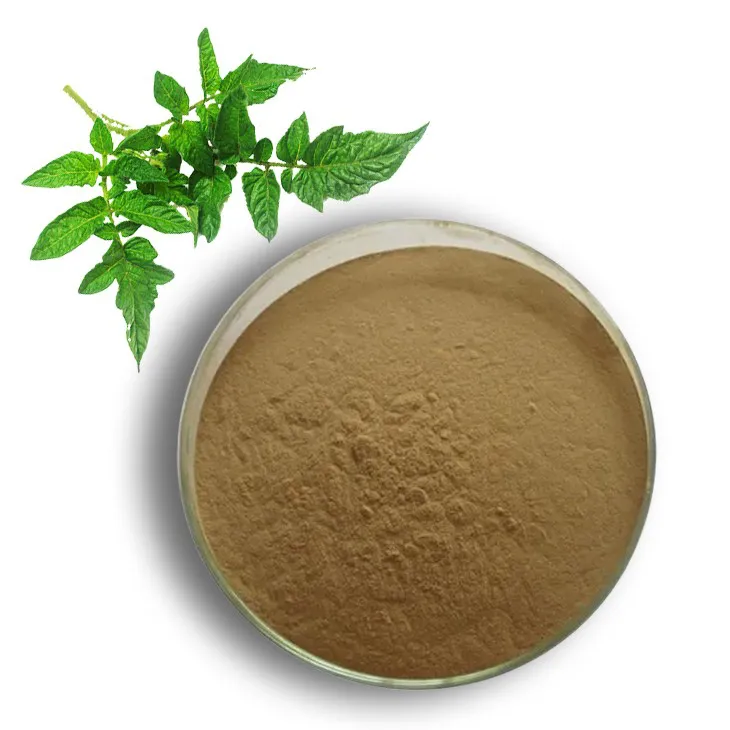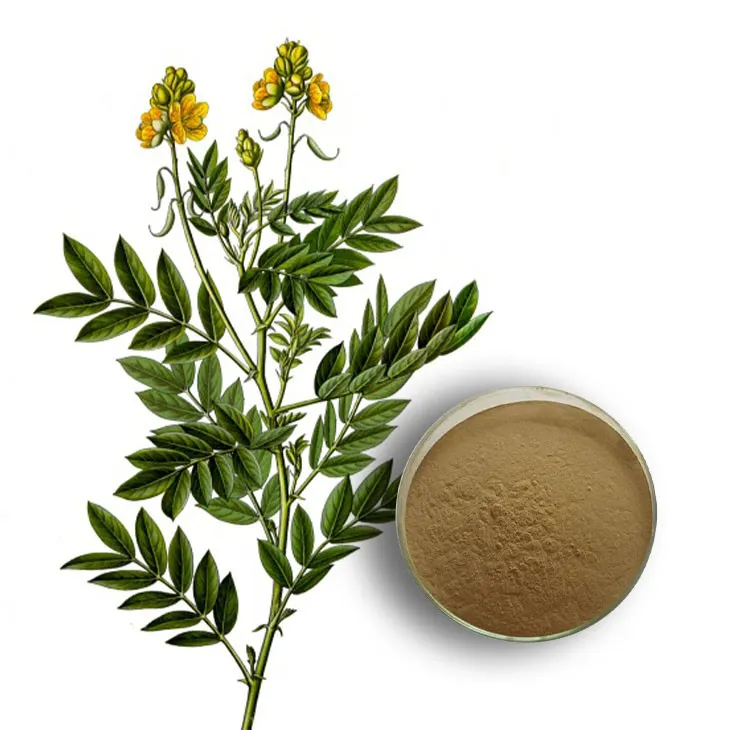- 0086-571-85302990
- sales@greenskybio.com
The Best Herbs for Treating Anxiety and Insomnia: Senna Leaf Extract
2024-11-11

Introduction
Anxiety and insomnia are two prevalent issues in modern society that can significantly impact an individual's quality of life. Senna Leaf Extract, an herbal remedy, has emerged as a potential solution for these problems. In this article, we will explore the various aspects of Senna Leaf Extract in relation to treating anxiety and insomnia, including its properties, mechanisms of action, scientific evidence, proper usage, and potential side - effects.

Properties of Senna Leaf Extract
Senna is a plant native to certain regions of Africa and Asia. The leaves of the senna plant contain a variety of chemical compounds that contribute to its potential therapeutic effects.
Active Compounds
One of the main active compounds in senna leaf extract is sennosides. These are anthraquinone glycosides that are responsible for the laxative properties of senna. However, recent research has suggested that other components in the extract may also play a role in its effects on the nervous system.
Antioxidant Properties
Senna leaf extract also exhibits antioxidant properties. Antioxidants are substances that can neutralize harmful free radicals in the body. By reducing oxidative stress, the extract may have a positive impact on the overall well - being of an individual, which could potentially be related to its effects on anxiety and insomnia.

How Senna Leaf Extract Interacts with the Body
The way senna leaf extract interacts with the body is complex and multi - faceted.
Effects on the Nervous System
Although the exact mechanisms are not fully understood, it is believed that senna leaf extract may influence neurotransmitter levels in the brain. For example, it may affect the levels of serotonin, a neurotransmitter that is closely associated with mood regulation. By modulating serotonin levels, the extract could potentially help to relieve anxiety symptoms.
Digestive System and Gut - Brain Axis
As mentioned earlier, senna has laxative properties. The digestive system and the brain are connected through the gut - brain axis. Changes in the digestive system, such as those induced by senna, may send signals to the brain that can affect mood and sleep. It is possible that the improvement in the digestive function due to senna can indirectly contribute to better mental health and sleep quality.

Scientific Evidence for Senna Leaf Extract in Treating Anxiety and Insomnia
Several scientific studies have been conducted to investigate the effectiveness of senna leaf extract in treating anxiety and insomnia.
Animal Studies
In animal studies, researchers have observed that senna leaf extract administration can lead to changes in behavior that are associated with reduced anxiety. For example, in mice exposed to stress - inducing situations, those treated with senna leaf extract showed less signs of anxiety - like behavior compared to the control group. These results suggest that the extract may have anxiolytic (anxiety - relieving) properties.
Human Studies
While there are fewer human studies compared to animal studies, some preliminary investigations have shown promising results. In a small - scale clinical trial, participants with mild to moderate anxiety and insomnia reported an improvement in their symptoms after taking senna leaf extract supplements for a certain period. However, more large - scale and long - term human studies are needed to confirm these findings.
Proper Usage of Senna Leaf Extract
When using senna leaf extract for anxiety and insomnia, it is important to follow the proper usage guidelines.
Dosage
The appropriate dosage of senna leaf extract can vary depending on factors such as age, health condition, and the severity of the symptoms. In general, it is recommended to start with a low dose and gradually increase it if necessary. However, it is crucial to consult a healthcare professional before determining the optimal dosage.
Administration Forms
Senna leaf extract is available in various forms, including capsules, tablets, and tinctures. The choice of administration form may depend on personal preference and ease of use. For example, capsules are often more convenient for those who do not like the taste of herbal extracts, while tinctures may be absorbed more quickly by the body.
Potential Side - Effects of Senna Leaf Extract
Although senna leaf extract has potential benefits, it is also important to be aware of its potential side - effects.
Digestive Side - Effects
Due to its laxative properties, overuse of senna leaf extract can lead to digestive problems such as diarrhea, abdominal cramps, and nausea. To avoid these side - effects, it is essential to use the extract as directed and not exceed the recommended dosage.
Allergic Reactions
Some individuals may be allergic to senna. Allergic reactions can range from mild symptoms such as skin rashes and itching to more severe symptoms like difficulty breathing. If any signs of an allergic reaction occur after taking senna leaf extract, it is necessary to stop using it immediately and seek medical attention.
Comparisons with Other Herbs
There are several other herbs that are also known for their potential effects on anxiety and insomnia. Comparing senna leaf extract with these herbs can provide a better understanding of its unique properties.
Valerian Root
Valerian root is a well - known herb for treating insomnia. Unlike senna, valerian root mainly acts on the GABA (gamma - aminobutyric acid) receptors in the brain, which are inhibitory neurotransmitter receptors. While senna may affect serotonin levels, valerian root's mechanism of action is more focused on promoting relaxation through the GABAergic system. However, both herbs have shown potential in improving sleep quality.
Lavender
Lavender is often used in aromatherapy for its calming effects. It contains various volatile oils that can interact with the olfactory system and have an impact on the nervous system. In contrast to senna leaf extract, lavender's effects are more immediate and are mainly related to relaxation through the sense of smell. Senna, on the other hand, has a more systemic effect on the body through its chemical components.
Conclusion
Senna leaf extract shows potential as an herbal remedy for treating anxiety and insomnia. Its properties, mechanisms of action, and scientific evidence suggest that it may be a valuable addition to the range of natural treatments available. However, further research is needed to fully understand its effectiveness and safety, especially in long - term use. When considering using senna leaf extract for these conditions, it is always advisable to consult a healthcare professional to ensure proper usage and to minimize the risk of potential side - effects.
FAQ:
What are the properties of senna leaf extract that make it effective for anxiety and insomnia?
Senna leaf extract contains certain compounds that may have a calming effect on the nervous system. Some of its properties include anti - inflammatory and antioxidant effects. These properties can help reduce stress and inflammation in the body, which are often associated with anxiety and insomnia. Additionally, it may interact with neurotransmitters in the brain to promote relaxation.
How does senna leaf extract interact with the body to treat anxiety and insomnia?
Senna leaf extract may interact with the body's neurotransmitters, such as GABA (gamma - aminobutyric acid). GABA is an inhibitory neurotransmitter that helps to calm the nervous system. By enhancing GABA activity or influencing other neurotransmitter systems involved in mood regulation, senna leaf extract can potentially reduce anxiety and improve sleep. It may also have an impact on the body's hormonal balance, which can be disrupted in cases of anxiety and insomnia.
What scientific evidence supports the use of senna leaf extract for anxiety and insomnia?
Several scientific studies have been conducted on the effects of senna leaf extract. Some research has shown that in animal models, the extract has led to reduced signs of anxiety - like behavior. In vitro studies have also demonstrated its potential to modulate neurotransmitter levels. However, more comprehensive human studies are still needed to fully establish its efficacy for treating anxiety and insomnia in humans.
What is the proper usage of senna leaf extract for anxiety and insomnia?
The proper usage of senna leaf extract can vary. It can be taken in the form of a supplement, usually in capsule or tincture form. The recommended dosage typically depends on factors such as age, overall health, and the severity of the condition. It is important to follow the instructions provided by a healthcare professional or on the product label. In general, starting with a low dose and gradually increasing if necessary while monitoring for any adverse effects is a good approach.
What are the potential side - effects of using senna leaf extract for anxiety and insomnia?
Some potential side - effects of using senna leaf extract may include gastrointestinal issues such as diarrhea, abdominal cramps, and nausea. This is because senna is also a laxative. In some cases, allergic reactions may occur. It is important to discontinue use if any unusual or severe side - effects are experienced and consult a healthcare provider.
How does senna leaf extract compare to other herbs for treating anxiety and insomnia?
Compared to other herbs, senna leaf extract has its own unique properties. For example, chamomile is also known for its calming effects, but it works through different mechanisms, mainly by having anti - spasmodic and mild sedative properties. Valerian root is another herb used for anxiety and insomnia, and it mainly acts on the GABA receptors like senna leaf extract to some extent, but valerian may have a stronger sedative effect. Each herb has its own benefits and potential drawbacks, and the choice may depend on individual response and the specific nature of the anxiety and insomnia symptoms.
Related literature
- The Efficacy of Herbal Remedies in Treating Anxiety Disorders"
- "Senna Leaf Extract: A Comprehensive Review of its Pharmacological Properties"
- "Herbal Treatments for Insomnia: A Scientific Perspective"
- ▶ Hesperidin
- ▶ citrus bioflavonoids
- ▶ plant extract
- ▶ lycopene
- ▶ Diosmin
- ▶ Grape seed extract
- ▶ Sea buckthorn Juice Powder
- ▶ Beetroot powder
- ▶ Hops Extract
- ▶ Artichoke Extract
- ▶ Reishi mushroom extract
- ▶ Astaxanthin
- ▶ Green Tea Extract
- ▶ Curcumin Extract
- ▶ Horse Chestnut Extract
- ▶ Other Problems
- ▶ Boswellia Serrata Extract
- ▶ Resveratrol Extract
- ▶ Marigold Extract
- ▶ Grape Leaf Extract
- ▶ blog3
- ▶ blog4
- ▶ blog5
-
Organic Tongkat Ali extract powder factory.
2024-11-11
-
How to make powder with ashwagandha extract.
2024-11-11
-
Rosehip extract manufacturers from China.
2024-11-11
-
The best cat's claw extract in nature.
2024-11-11
-
Chinese Dandelion Leaf Extract Suppliers.
2024-11-11
-
Elderberry Extract
2024-11-11
-
Apricot Powder
2024-11-11
-
Red Vine Extract
2024-11-11
-
Buckthorn bark extract
2024-11-11
-
Hawthorn powder
2024-11-11
-
Longan Extract
2024-11-11
-
Mango flavored powder
2024-11-11
-
Calendula Extract
2024-11-11
-
Chasteberry Extract
2024-11-11
-
Citrus Aurantii Extract
2024-11-11





















